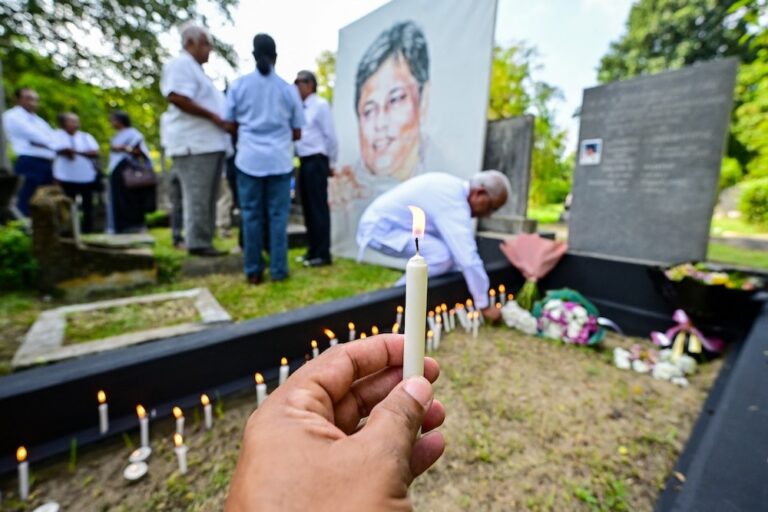(FMM/IFEX) – The following is a 9 August 2007 FMM joint statement with other organisations: Press statement condemning military interference on Jaffna NGOs meetings with UN Under Secretary General on Humanitarian Affairs 9 August 2007, Colombo, Sri Lanka – As civil society organizations concerned about the deteriorating human rights and humanitarian situation in Sri Lanka, […]
(FMM/IFEX) – The following is a 9 August 2007 FMM joint statement with other organisations:
Press statement condemning military interference on Jaffna NGOs meetings with UN Under Secretary General on Humanitarian Affairs
9 August 2007, Colombo, Sri Lanka – As civil society organizations concerned about the deteriorating human rights and humanitarian situation in Sri Lanka, we welcome the visit of UN Under Secretary General on Humanitarian Affairs, Mr. John Holmes, to Sri Lanka. An objective on-the-ground assessment of the situation in Sri Lanka, carried out by a person of his standing, would have been a critical component of any future discussions on a return to peace in Sri Lanka.
Sadly, however, we have learned that Mr. Holme’s attempt to meet with civil society representatives during his visit to Jaffna on 7 August 2007 was marred by the heavy presence of the military at the Jaffna Public Library, where the meeting was held.
Our colleagues in Jaffna have also conveyed to us that on the day before Mr. Holme’s visit to Jaffna, the military commander called for a meeting at Palaly military headquarters, at which NGOs and civil society representatives were instructed not to refer to human rights issues and to restrict themselves to issues of humanitarian assistance during their meeting with Mr. Holmes. The military told the NGO and civil society representatives present that they, the military, would brief Mr. Holmes about the human rights and security situation, while the Government Agent would brief Mr. Holmes about the situation of Internally Displaced Persons (IDPs).
Humanitarian and human rights groups in Jaffna have expressed their serious reservations about this interference by the military and regret their inability to meet Mr. Holmes in a more private manner, which would have enabled them to freely share their views, perspectives and experiences with him.
We condemn this type of military interference in matters relating to civil society and NGO activity. This completely undermines existing practice in which visiting UN officials meet with civil society groups during country visits, insisting on privacy for such meetings, even going as far as declining invitations when these conditions are not met. Given the high levels of insecurity, that include killings and abductions, faced by humanitarian agencies, human rights organisations and other civil society organisations, we are also deeply concerned about the security implications for the actors who were invited to the meetings.
The steps taken by the military in Jaffna to restrict Mr. Holmes’ access to information can only reaffirm concerns in the international community that there is no transparency and accountability of the government and of the military when it comes to both human rights and humanitarian issues in the conflict-affected areas of Sri Lanka.
We trust that Mr. Holmes will reflect these concerns in his reports, on the basis that his ability to obtain an objective assessment of the situation on the ground in the country, based on perspectives of various stakeholders including humanitarian agencies, was negatively affected by this situation.
Centre for Policy Alternatives
Free Media Movement
INFORM Human Rights Documentation Centre
International Movement Against All Forms of Racial Discrimination
Law & Society Trust
Rights Now


